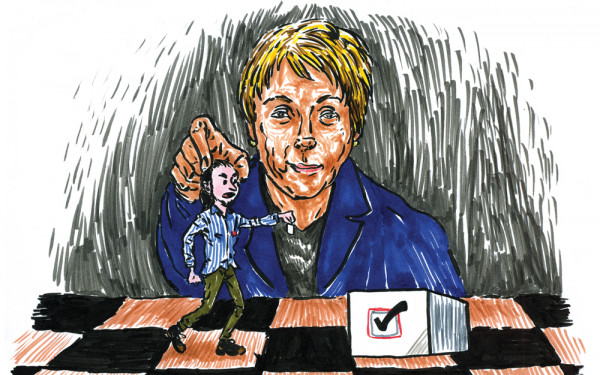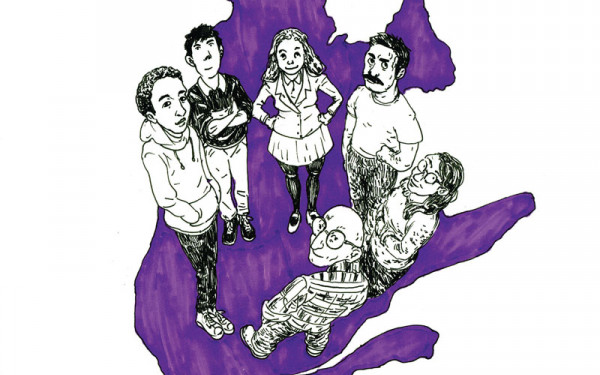Montrealers March Against Charter of Values
Thousands Protest Proposed Ban on Religious Symbols
Thousands of protesters took to the streets of downtown Montreal on Saturday to denounce the provincial government’s proposed Charter of Quebec Values.
If passed in Quebec’s National Assembly, the charter would ban public sector employees—such as those working for government departments, state-subsidized daycare centres, schools, colleges, universities, hospitals and municipalities—from wearing “ostentatious” religious symbols like turbans, hijabs, niqabs, kippas and large crosses.
The proposed charter would not, however, affect the crucifix currently hanging in the National Assembly, as well as the large cross atop Mount Royal, which the governing Parti Québécois says are part of the province’s heritage.
Organizers said 40,000 people attended the protest.
Not A Feminist Charter?
On a website promoting the charter, the provincial government has billed its proposal as a way of preserving the religious neutrality of public institutions and protecting equality between the sexes.
But Julie Michaud, an administrative coordinator at the Centre for Gender Advocacy, disagrees with the assertion that the proposed charter is taking a feminist stance by prohibiting Muslim women working in government institutions from wearing headscarves.
“Telling women what they can or cannot do with their bodies is not feminist in any way,” said Michaud, who attended the protest. “Muslim women have their own right to self-determination, and they are perfectly capable of deciding what the right choice is for them.
“They don’t need white Western feminists to tell them how to be liberated,” she continued, adding that “many of these Muslim women were born and raised right here [in Quebec].”
“They are as Québécois as anybody else here. They can make their own choices,” Michaud said.
Concordia Student Union arts and science councillor Hajar El Jahidi, who acted as the union’s VP Academic and Advocacy last year, was also in attendance Saturday.
“As Canadians, it’s important for us to come down and show our values of inclusivity and tolerance, mutual respect and multiculturalism,” El Jahidi said, noting that she—as a Muslim woman—would be one of the people affected by the charter.
Video Brandon Johnston
El Jahidi said the hijab represents different things to different people. To her, it represents “being a better person, being modest,” she said.
“It’s one of the ways that I can reach higher ideals as a human being,” she said. “I feel that my way of accomplishing these ideals and these values as a human person are being taken away when I see these kinds of pieces of legislation [being brought forward].”
Effects on Public Institutions
Robert Green, who served as the CSU’s president from 1999-2001, said staff members at Westmount High School, the public secondary school where he now teaches, are concerned about the effects such a charter could have on students.
“We feel strongly that students of diverse ethnic backgrounds should have just as much a right to have role models in front of them in the class [who share their cultural identities] as any other student,” he said. “We worry that this is going to stigmatize groups that are already marginalized in Quebec society.”
Green went on to say that Westmount High School values the diversity of its student body and that teachers and students are mobilizing against the charter.
“This [charter] is making a mockery of the Quebec curriculum, which in a number of different subject matters presents Quebec society as an open society that’s respectful of diversity, respectful of people’s fundamental rights,” he said.
3web_900_598_90.JPG)
Taking a Stand
Deana Ghazaly, who wears a hijab and attended Saturday’s protest, said she shouldn’t have to choose between her religion and a job in the public service.
“I feel like this whole [charter] is to cover up larger issues,” she said. “There’s so much going on right now, the economy [is] going really badly.
“I feel like [Marois] is just looking for something to make a lot of noise and cover up [other issues]—it’s purely political,” she continued. “I don’t think she even believes in this, honestly.”
Naam Singh, a 30-year-old practicing Sikh, attended the protest because he feels the proposed charter is discriminatory and fails to represent what Quebecers actually believe in.
“We just want to live our lives, work, go to school, feed our families, and by [Marois] doing this, it’s playing games with other people’s lives and livelihoods,” he said.
After a few speeches by the protest’s organizers, the march left Place Émilie-Gamelin shortly before 1 p.m. and proceeded down de Maisonneuve Blvd., eventually ending up at Place du Canada.
Along much of the protest route, protesters chanted slogans demanding an end to discrimination and likening the PQ’s values to “racist values” and the proposed charter to a simple “vote-getting” effort. Recent opinion polls suggest that a majority of Quebecers support the Charter.
Under the PQ’s plans, municipalities and other government institutions could get a renewable five-year exemption from the charter.
The four perceived frontrunners in the Montreal mayoral race—Richard Bergeron, Denis Coderre, Marcel Côté and Mélanie Joly—have all said they oppose the charter and have vowed to use the exemption clause, according to Radio-Canada.
The mayoral candidates’ position reveals a political schism between Montreal and other regions in Quebec.
The proposed charter has not yet been tabled in the provincial legislature, though ads purchased by the provincial government to promote it can already be seen in Montreal’s metro stations.
Bernard Drainville, Quebec’s Minister for Democratic Institutions and Active Citizenship, explained the idea behind the charter at a press conference on Sept. 10.
An online petition against the charter proposal has collected over 10,000 signatures so far.
—With files from Andrew Brennan

5web_900_598_90.JPG)
4web_900_598_90.JPG)
2web_900_598_90.JPG)
_600_832_s.png)


_600_375_90_s_c1.jpg)

